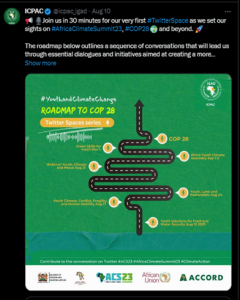Climate philanthropy goes beyond charity, it is an investment in the planet we inherit and the legacy we leave behind. African youth are at the forefront in developing cutting-edge tactics for climate adaptation.
They contribute new insights, technological expertise, and community-based solutions, which are essential for developing sustainable plans. A webinar done by AfriLab with the youth revealed similar insights. The power of philanthropy, a force capable of catalyzing positive change, finds a purpose in fostering the passion and ingenuity of the younger generation. The resounding voices of the youth echo with a profound urgent call to action to secure their future to combat climate change. It is within this transformative backdrop that youth aspirations on climate action should intersect with philanthropy.
Empowering Youth-led Initiatives Beyond Funding
To meet current demands, philanthropy must transition from passive support to active collaboration. Financial backing alone is insufficient; engagement must extend to mentorship, capacity building, and platforms amplifying youth voices. Youth bring fresh perspectives and innovative approaches to tackling climate change therefore philanthropy should recognize and support these unique qualities, fostering an environment where young activists are encouraged to think creatively and act boldly.
Having capital support for youth taking up eco-friendly measures that bring forth long-term solutions, should be key. They would also benefit from mentorship, training on new emerging technologies, exchange visits with other youth in similar initiatives, support to advocate for more helpful and enabling policies at local, national and international level.
Collaboration for Long-term Sustainability
Philanthropic organizations must actively collaborate with youth organizations and activists for long-term sustainability and impact. This partnership involves co-creating strategies, sharing decision-making processes, and fostering a system where the insights of both parties are valued equally. Intergenerational conversations are essential because they foster understanding, leverage various perspectives, and produce more comprehensive solutions to the problem of climate change. A commitment to environmental stewardship can be passed down from elder generations to younger generations, who will then carry on the work. Youth for Green Action Kenya is a successful example as they highlight the potential of such collaborations but also reveal the need for technological innovation.
Transformative grant making
Philanthropy needs to adapt its grant-making criteria to accommodate innovative youth-led proposals. Traditional metrics such as long track records, and risk aversion may not capture the potential of innovative and unconventional approaches that youth often bring to the table for example youth start-ups may lack historical financial performance, unproven cutting-edge technologies and lack of risk and management strategies that may seem riskier when evaluating through traditional metrics. Open-mindedness and flexibility in the grant-making process are crucial to demonstrating a commitment to adaptability. Investing in the capacity of future leaders promotes a culture of innovation that can adapt to the changing climate.
Amplifying Youth Voices
Youth leverage the power of social media and storytelling to address climate change, from community-based projects to global advocacy. Social media campaigns play a crucial role in raising awareness and encouraging visibility through using online movements such as Twitter with hashtags. The youth engagement on thematic Twitter space talks [#youthandclimatechange] organized by ICPAC (IGAD Climate Prediction and Application Center) ahead of youth Africa Climate Summit (ACS) in Kenya and COP28, allowed them to share their opinions and advisories that were used to inform the ACS Youth’s Nairobi Declaration.
Empowering Youth Leaders
Climate philanthropists have derived lessons from the intersection of youth engagement and climate philanthropy offering a blueprint for future strategies. Acknowledging the agency of young leaders is crucial, therefore philanthropists must recognize that youth are not just recipients of funds; they are change-makers capable of driving sustainable solutions.
Youth-led project efficiency can be increased by philanthropists through provision of financial resources for research, the adoption of new technologies, and the execution of innovative solutions, as well as through mentoring programmes that link activists with seasoned experts. This will help them learn from their experience, improve their methods, and achieve better results.
Call for Action
A crucial call for action is directed towards philanthropists who do not fund climate issues, urging them to recognize the interconnectedness of environmental and climate issues with broader social and economic challenges. Philanthropy has the power to influence not only environmental policies but also social and economic structures that underpin climate vulnerability.
Philanthropists in non-climate space can integrate climate considerations into existing portfolios. Whether focusing on water, education, agriculture and food security, health, or human rights and social justice, they can strategically align their efforts with climate resilience and mitigation goals. This interconnected approach recognizes that climate change is not a standalone issue as it permeates every aspect of our societies.
Philanthropist’s efforts should extend to regions where the youth face immediate climate extremes, beyond conferences and forums. By forging partnerships, between philanthropists and youth-led initiative, philanthropic organizations can co-create strategies, share decision-making processes, and foster an ecosystem where the insights of both are valued equally. This global collaboration will not only enhance the effectiveness of youth-led initiatives but also contribute to the development of a holistic and inclusive approach to climate action.
Alexia Kioko is a Community Development Practitioner at ICPAC in Nairobi, Kenya.
Melissa Ouya is a gender and climate change expert at ICPAC in Nairobi, Kenya





Comments (0)
Well written!